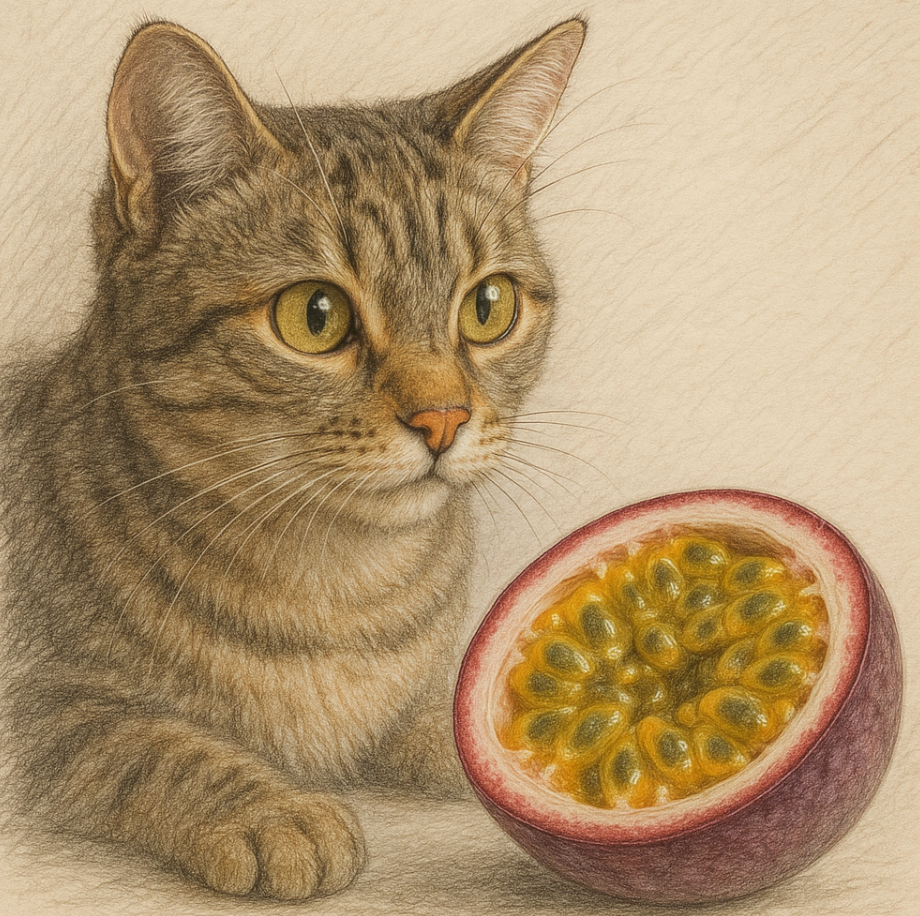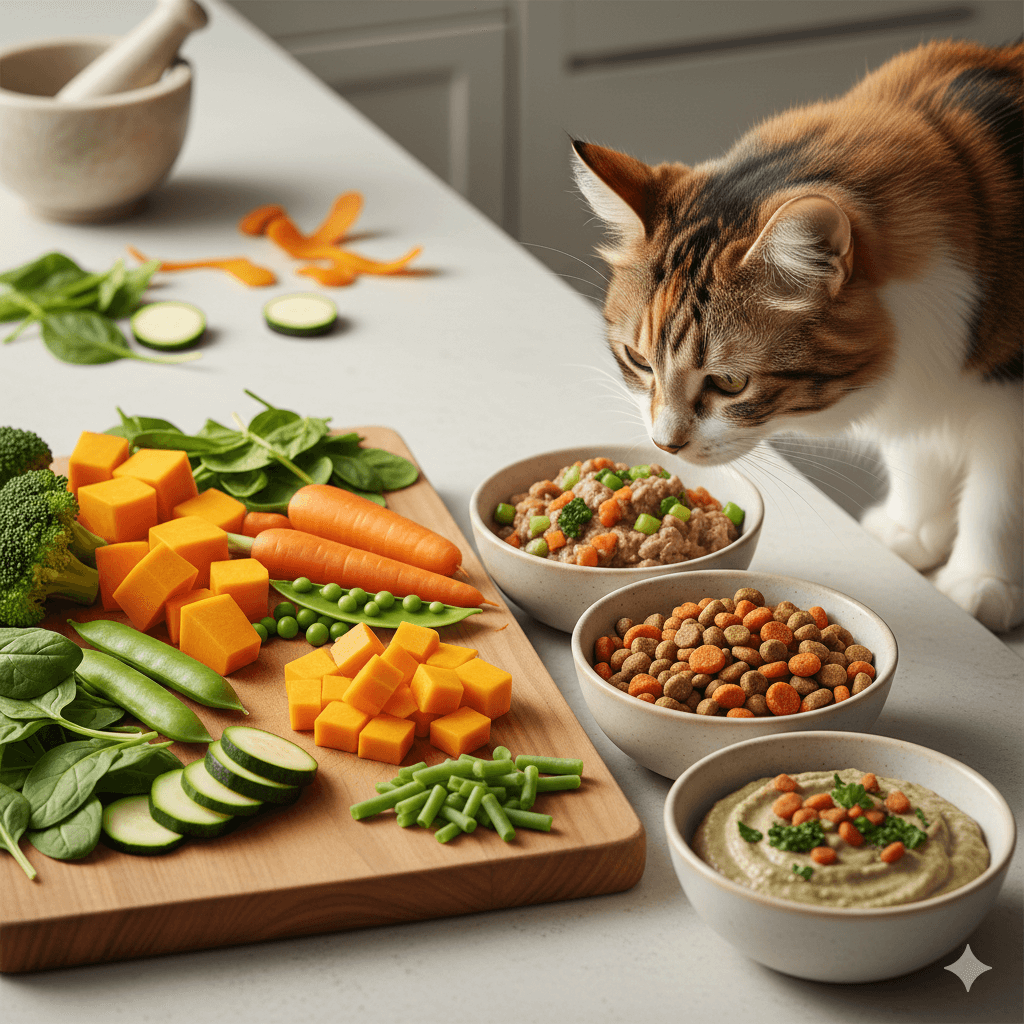Can Cats Eat Passion Fruit?
As a cat owner, you may have wondered whether your feline friend can safely enjoy exotic fruits like passion fruit. While cats are obligate carnivores and don’t require fruits in their diet, they sometimes show curiosity about human foods. Passion fruit, with its tangy flavor and unique texture, might catch your cat’s attention—but is it safe for them to eat? In this blog post, we’ll explore everything you need to know about feeding passion fruit to cats, including potential benefits, risks, and safer alternatives. By understanding the facts, you can make informed decisions about your cat’s diet and ensure their health and happiness.
Potential Risks of Feeding Passion Fruit to Cats
While passion fruit isn’t toxic to cats, it does come with certain risks that every pet owner should be aware of. Cats have sensitive digestive systems, and introducing unfamiliar foods can lead to complications.
High Sugar Content:
Passion fruit contains natural sugars, which can upset a cat’s stomach and contribute to weight gain if consumed in large amounts.Digestive Upset:
The fiber and acidity in passion fruit may cause vomiting, diarrhea, or bloating in some cats.Choking Hazard from Seeds:
The small, hard seeds inside passion fruit could pose a choking risk if swallowed whole.Allergic Reactions:
Although rare, some cats may experience allergic reactions such as itching or swelling after eating passion fruit.Toxicity Concerns (if not fresh):
Processed passion fruit products, like juices or desserts, often contain additives or artificial sweeteners (e.g., xylitol) that are harmful to cats.
These risks highlight why moderation and supervision are essential when offering passion fruit to your cat. Always prioritize their safety over curiosity.
Benefits of Passion Fruit for Cats (in Moderation)
When offered sparingly and prepared correctly, passion fruit can provide minor benefits for cats. However, these advantages are limited due to their carnivorous nature.
Hydration Boost:
The juicy pulp of passion fruit contains water, which can help keep your cat hydrated, especially during hot weather.Antioxidant Properties:
Passion fruit is rich in antioxidants like vitamin C, which may support your cat’s immune system in small amounts.Mental Stimulation:
Allowing your cat to explore new textures and flavors can provide mental enrichment and satisfy their curiosity.Low-Calorie Treat Option:
A tiny piece of plain passion fruit is low in calories, making it a safer occasional treat compared to high-fat snacks.Natural Source of Fiber:
In very small quantities, the fiber in passion fruit can aid digestion—but only if your cat tolerates it well.
While these benefits exist, they must be weighed against the potential risks to determine if passion fruit is truly suitable for your cat.
Check this guide 👉Can Cats Eat Dragon Fruit? Best 7 Expert Tips!
Check this guide 👉Can Cats Eat Sunflower Oil? Best 7 Expert Tips!
Check this guide 👉Can Cats Eat Liverwurst? Best 7 Expert Tips!

Safe Fruits for Cats | Foods to Avoid Giving Cats |
|---|---|
Blueberries | Grapes and raisins |
Watermelon (seedless) | Chocolate |
Apples (core removed) | Onions and garlic |
Bananas (in small amounts) | Dairy products |
Strawberries | Alcohol |
How to Safely Introduce Passion Fruit to Your Cat
If you decide to let your cat try passion fruit, it’s important to take precautions to minimize risks. Follow these guidelines to ensure a safe experience.
Choose Fresh Over Processed:
Only offer fresh, ripe passion fruit without any added sugars, preservatives, or artificial ingredients.Remove Seeds and Skin:
Scoop out the pulp and discard the seeds and tough outer skin to prevent choking or digestive issues.Offer Tiny Portions:
Start with a pea-sized amount of pulp to see how your cat reacts before giving more.Monitor for Reactions:
Watch for signs of digestive upset, such as vomiting or diarrhea, and consult your vet if symptoms occur.Consult Your Veterinarian:
Before introducing any new food, seek advice from your vet to ensure it aligns with your cat’s specific dietary needs.
By following these steps, you can mitigate risks while allowing your cat to enjoy the occasional taste of passion fruit.
Signs Your Cat May Not Tolerate Passion Fruit
Even with precautions, complications can arise if your cat consumes passion fruit improperly. Watch for these warning signs to act quickly if something goes wrong.
Vomiting or Diarrhea:
These symptoms may indicate that your cat has ingested too much fiber or sugar from the fruit.Excessive Drooling:
Drooling could signal irritation or discomfort caused by the fruit’s acidity or texture.Lethargy or Discomfort:
A sudden lack of energy or signs of pain might suggest an adverse reaction to the fruit.Pawing at the Mouth:
This behavior often indicates that your cat is experiencing discomfort or has a foreign object stuck in their mouth.Refusal to Eat Regular Food:
If your cat avoids their usual meals after trying passion fruit, it could mean they’re feeling unwell.
Recognizing these signs early allows you to seek veterinary care promptly, preventing further complications.
Common Mistakes to Avoid When Feeding Fruits to Cats
Feeding fruits to cats requires careful consideration to avoid mistakes that could endanger their health. Here are some pitfalls to watch out for.
Overfeeding Sugary Fruits:
Too much sugar can lead to obesity, diabetes, or dental problems in cats. Always limit portion sizes.Ignoring Allergies or Sensitivities:
Some cats may react negatively to certain fruits; monitor their behavior closely after introduction.Giving Processed Fruits:
Processed fruits often contain harmful additives like artificial sweeteners or preservatives. Stick to fresh options.Forgetting to Remove Seeds or Pits:
Many fruit seeds and pits are choking hazards or contain toxins. Always prepare fruits carefully.Assuming All Fruits Are Safe:
Not all fruits are cat-friendly—grapes, cherries, and citrus fruits can be toxic. Research thoroughly before offering anything new.
Avoiding these mistakes ensures a safer and healthier experience for your cat.
Alternatives That Mimic the Benefits of Passion Fruit
If you’re hesitant about feeding passion fruit, there are plenty of alternatives that mimic its benefits without the associated risks.
Blueberries:
Low in calories and packed with antioxidants, blueberries are a safe and nutritious treat for cats.Watermelon (Seedless):
This hydrating fruit provides a refreshing snack, especially during warmer months.Plain Cooked Pumpkin:
Rich in fiber, pumpkin can aid digestion and is a great alternative to passion fruit’s fibrous pulp.Apples (Core Removed):
Apples offer vitamins and hydration without the acidity or seeds found in passion fruit.Freeze-Dried Meat Treats:
For a protein-rich option that satisfies your cat’s carnivorous instincts, freeze-dried meats are an excellent choice.
These alternatives allow you to cater to your cat’s nutritional needs while keeping them safe.
Understanding Your Cat’s Natural Instincts Around Fruits
Cats are naturally curious creatures, and their interest in fruits like passion fruit stems from their exploratory behavior. Understanding their instincts helps explain their fascination.
Curiosity About New Textures:
Cats use their paws and mouths to investigate unfamiliar objects, including fruits with unique textures like passion fruit.Attraction to Strong Smells:
The fragrant aroma of passion fruit may intrigue cats, even though they lack the ability to taste sweetness fully.Playful Behavior:
Rolling or batting at fruits can be a form of play, satisfying their need for mental stimulation.Instinctual Foraging:
Though domesticated, cats retain traces of their wild ancestors’ foraging habits, leading them to explore edible items.Limited Nutritional Interest:
Unlike omnivorous pets, cats derive no significant nutritional value from fruits, making them purely experimental treats.
By recognizing these behaviors, you can better address your cat’s curiosity in a safe and controlled manner.
Frequently Asked Questions About Cats and Passion Fruit
Is passion fruit toxic to cats?
No, passion fruit is not toxic, but it can still cause digestive upset if consumed in large amounts.
Can kittens eat passion fruit?
Kittens should avoid passion fruit entirely due to their developing digestive systems, which are more sensitive than adult cats’.
How much passion fruit can I give my cat?
Limit portions to a pea-sized amount once or twice a month to avoid overwhelming their system.
What should I do if my cat eats a lot of passion fruit?
Contact your veterinarian immediately to assess the situation and prevent potential complications.
Are there safer fruits for cats than passion fruit?
Yes, fruits like blueberries, watermelon (seedless), and apples (core removed) are generally safer options.
Prioritizing Your Cat’s Health When Offering Human Foods
Feeding passion fruit to your cat can be a fun and enriching experience, but it comes with responsibilities. While this exotic fruit isn’t inherently toxic, its high sugar content, seeds, and acidity pose risks that shouldn’t be ignored. By understanding the dos and don’ts of offering passion fruit—and prioritizing safer alternatives—you can ensure your cat stays healthy and happy. Remember, your feline companion relies on you to make the best dietary choices for them. So, always err on the side of caution and consult your veterinarian whenever in doubt.
Can a Cat Be Tested for Rabies? Best 7 Expert Tips! – Learn if testing is possible, understand the process, and discover prevention tips to keep your cat safe from rabies.
Can a Dog Be Tested for Rabies? Best 7 Expert Tips! – Learn how rabies testing works, why it’s critical, and what every dog owner needs to know.
Best Vegetables for Cat Food: Best 7 Expert Tips! – Discover safe, nutritious veggies to boost your cat’s diet, support digestion, and enhance overall health naturally.
Best Vegetables for Dog Food: Best 7 Expert Tips! – Discover safe, nutritious veggies to boost your dog’s diet, support digestion, and enhance overall health naturally.




